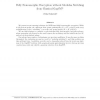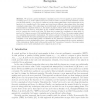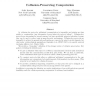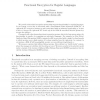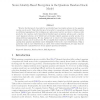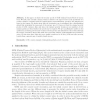CRYPTO
2012
Springer
13 years 3 months ago
2012
Springer
123
Voted
CRYPTO
2012
Springer
13 years 3 months ago
2012
Springer
We propose a general multiparty computation protocol secure against an active adversary corrupting up to n−1 of the n players. The protocol may be used to compute securely arithm...
100
Voted
CRYPTO
2012
Springer
13 years 3 months ago
2012
Springer
In collusion-free protocols, subliminal communication is impossible and parties are thus unable to communicate “any information beyond what the protocol allows”. Collusion-fre...
132
click to vote
CRYPTO
2012
Springer
13 years 3 months ago
2012
Springer
We construct a functional encryption scheme secure against an a-priori bounded polynomial number of collusions for the class of all polynomial-size circuits. Our constructions req...
150
click to vote
CRYPTO
2012
Springer
13 years 3 months ago
2012
Springer
We provide a functional encryption system that supports functionality for regular languages. In our system a secret key is associated with a Deterministic Finite Automata (DFA) M....
115
Voted
CRYPTO
2012
Springer
13 years 3 months ago
2012
Springer
We give the first proof of security for an identity-based encryption scheme in the quantum random oracle model. This is the first proof of security for any scheme in this model ...
111
Voted
CRYPTO
2012
Springer
13 years 3 months ago
2012
Springer
Abstract. In this paper, we study the security proofs of GCM (Galois/Counter Mode of Operation). We first point out that a lemma, which is related to the upper bound on the probab...
